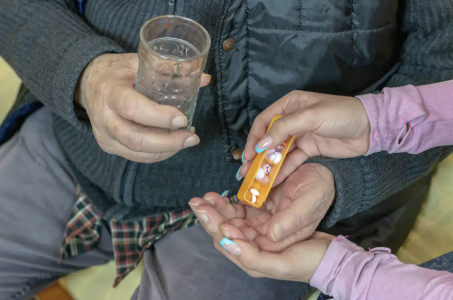One In Three People With Chronic Pain Have Difficulty Accessing Ongoing Prescriptions For Opioids
- Replies 32
One in five Australians live with chronic pain lasting three months or more. Common causes include back and neck pain, headache, and joint pain.
Opioid medicines – such as oxycodone, morphine, fentanyl and codeine – are essential medicines and provide relief to many people with this type of pain.
However, opioids can also cause side effects and harms including dependence and overdose, which may be fatal.
Over the past decade, measures have been introduced in Australia to curb growing rates of opioid use and harms. But this has come at the expense of access for some people who genuinely need them.
In our new study, one-third of participants prescribed opioids long-term for chronic, non-cancer pain had difficulties getting ongoing prescriptions.
States have also introduced prescription monitoring programs, allowing providers to see whether their patients are getting opioids from other doctors or pharmacies.

In some states, doctors and pharmacists can check if patients are getting scripts elsewhere. Shutterstock
We’re underaking a long-term study of just over 1,500 Australians prescribed opioids for chronic non-cancer pain. We started asking questions about accessing opioid prescriptions in our 2018 interviews with participants.
These weren’t prescriptions for new pain conditions, but ongoing prescriptions for people who had been using these medicines for four years, on average, and living with pain for ten years, before the study.
There has also been a 15-fold increase in opioid prescriptions dispensed on the PBS between 1995 and 2015. Australia currently ranks eighth among countries using the most opioids.
As opioid use has risen, so have harms. Opioids are the main drug involved in drug-induced deaths.
Pharmaceutical opioids are now involved in more deaths than heroin. Pharmaceutical opioids also contribute more to poisoning-related hospital visits than heroin, with hospitalisations doubling since 1999.
As opioids become more restricted, people may need to visit their doctor more frequently because they’re given smaller pack sizes and fewer repeats. They may be put in a position where they’re unable to get prescriptions if doctors aren’t available.
Opioids can cause dependence and tolerance with continuous and long-term use. However, sudden interruptions to opioid medicine supply may place people at risk of experiencing unpleasant withdrawal symptoms such as nausea and vomiting, flu symptoms, and muscle cramping.
One in ten people in our study reported their doctor wanted to reduce or stop opioid medicines against their wishes.
However, there were soon reports of opioids being ceased without reducing the dose first, which risks withdrawal. This prompted the CDC to warn that applying guidelines without adequate care could harm patients.
Worryingly, studies have linked stopping or reducing opioids with death by suicide and overdose, even for people prescribed opioids at low doses to begin with.
These studies also found people who stopped opioids were more likely to visit the emergency department or be admitted to hospital for mental health crises, illicit drug use and overdoses.
For some people, reducing or stopping opioids will be the right thing for them, clinically. Some studies suggest stopping opioids can be done without increasing pain.
Some studies suggest pain may even improve when opioids are stopped. However, participants in these studies are usually enrolled in special pain programs. These programs are notoriously difficult to access in Australia and it is common to wait months to years for services. Increased investment in pain services and programs is needed.
There is also a need for opioid tapering to be undertaken in a collaborative way, with patients and doctors working as a team to achieve agreed upon goals.

Opioid harms need to be recognised and addressed, as does pain. Shutterstock
When it comes to using opioids for chronic non-cancer pain, it’s important to balance both benefits and harms. Potential opioid-related harms need to be recognised and addressed. At the same time, adequate treatment of pain is essential, and we need to make sure people don’t suffer harms due to changes to opioid access.
The needs of people who live with pain and the impact of restrictions on them need to remain at the centre of all decisions and discussions about opioids.
This article was first published on The Conversation, and was written by Ria Hopkins PhD Candidate, National Drug and Alcohol Research Centre from UNSW Sydney and Natasha Gisev Clinical pharmacist and Scientia Senior Lecturer at the National Drug and Alcohol Research Centre from UNSW Sydney
Opioid medicines – such as oxycodone, morphine, fentanyl and codeine – are essential medicines and provide relief to many people with this type of pain.
However, opioids can also cause side effects and harms including dependence and overdose, which may be fatal.
Over the past decade, measures have been introduced in Australia to curb growing rates of opioid use and harms. But this has come at the expense of access for some people who genuinely need them.
In our new study, one-third of participants prescribed opioids long-term for chronic, non-cancer pain had difficulties getting ongoing prescriptions.
Tightening access
In 2018, codeine was made a “prescription-only” medicine. In the same year, Australia’s Chief Medical Officer wrote to doctors prescribing a lot of opioids to encourage them to consider reducing their prescribing.States have also introduced prescription monitoring programs, allowing providers to see whether their patients are getting opioids from other doctors or pharmacies.

In some states, doctors and pharmacists can check if patients are getting scripts elsewhere. Shutterstock
We’re underaking a long-term study of just over 1,500 Australians prescribed opioids for chronic non-cancer pain. We started asking questions about accessing opioid prescriptions in our 2018 interviews with participants.
These weren’t prescriptions for new pain conditions, but ongoing prescriptions for people who had been using these medicines for four years, on average, and living with pain for ten years, before the study.
Opioids can cause significant harm
Over the past 30 years, the amount of opioids (doses per Australian per day) dispensed on the Pharmaceutical Benefits Scheme (PBS) has increased four-fold.There has also been a 15-fold increase in opioid prescriptions dispensed on the PBS between 1995 and 2015. Australia currently ranks eighth among countries using the most opioids.
As opioid use has risen, so have harms. Opioids are the main drug involved in drug-induced deaths.
Pharmaceutical opioids are now involved in more deaths than heroin. Pharmaceutical opioids also contribute more to poisoning-related hospital visits than heroin, with hospitalisations doubling since 1999.
So what did our research find?
In our study, one in five people reported problems relating to accessing doctors.As opioids become more restricted, people may need to visit their doctor more frequently because they’re given smaller pack sizes and fewer repeats. They may be put in a position where they’re unable to get prescriptions if doctors aren’t available.
Opioids can cause dependence and tolerance with continuous and long-term use. However, sudden interruptions to opioid medicine supply may place people at risk of experiencing unpleasant withdrawal symptoms such as nausea and vomiting, flu symptoms, and muscle cramping.
One in ten people in our study reported their doctor wanted to reduce or stop opioid medicines against their wishes.
Patients and doctors need to work together
More doctors are practising “opioid tapering” (reducing opioid doses over time), especially in the United States, following the release in 2016 of Centers for Disease Control and Prevention (CDC) guidelines for chronic pain.However, there were soon reports of opioids being ceased without reducing the dose first, which risks withdrawal. This prompted the CDC to warn that applying guidelines without adequate care could harm patients.
Worryingly, studies have linked stopping or reducing opioids with death by suicide and overdose, even for people prescribed opioids at low doses to begin with.
These studies also found people who stopped opioids were more likely to visit the emergency department or be admitted to hospital for mental health crises, illicit drug use and overdoses.
For some people, reducing or stopping opioids will be the right thing for them, clinically. Some studies suggest stopping opioids can be done without increasing pain.
Some studies suggest pain may even improve when opioids are stopped. However, participants in these studies are usually enrolled in special pain programs. These programs are notoriously difficult to access in Australia and it is common to wait months to years for services. Increased investment in pain services and programs is needed.
There is also a need for opioid tapering to be undertaken in a collaborative way, with patients and doctors working as a team to achieve agreed upon goals.
Balancing benefits and harms
Since we conducted our study, new restrictions introduced in 2020 reduced the quantities of opioids that can be prescribed on the PBS. For most opioids, doctors can only supply quantities and repeats for up to three months at a time.
Opioid harms need to be recognised and addressed, as does pain. Shutterstock
When it comes to using opioids for chronic non-cancer pain, it’s important to balance both benefits and harms. Potential opioid-related harms need to be recognised and addressed. At the same time, adequate treatment of pain is essential, and we need to make sure people don’t suffer harms due to changes to opioid access.
The needs of people who live with pain and the impact of restrictions on them need to remain at the centre of all decisions and discussions about opioids.
This article was first published on The Conversation, and was written by Ria Hopkins PhD Candidate, National Drug and Alcohol Research Centre from UNSW Sydney and Natasha Gisev Clinical pharmacist and Scientia Senior Lecturer at the National Drug and Alcohol Research Centre from UNSW Sydney








